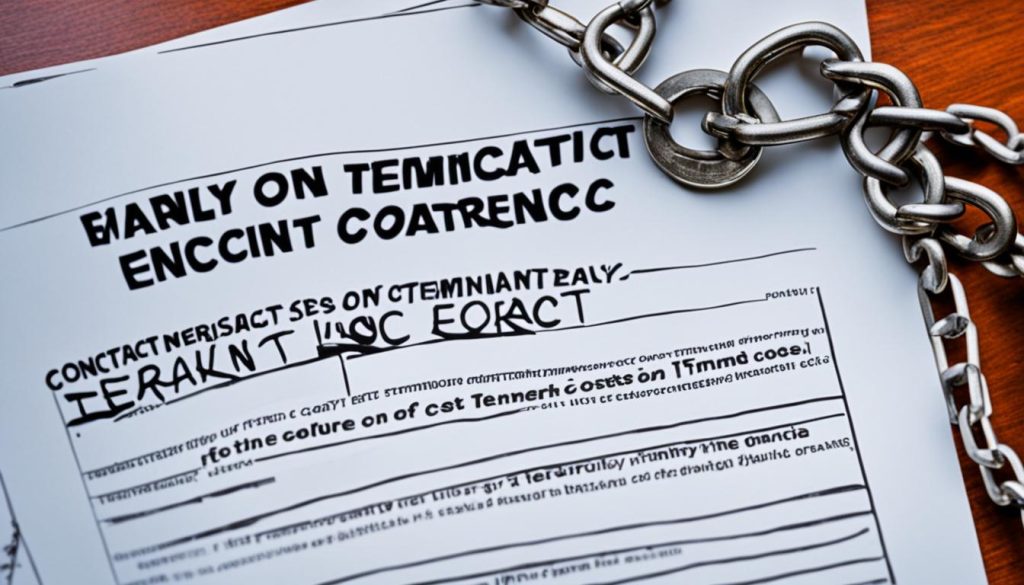In the United Kingdom, the early termination fee tenancy refers to a charge that landlords can impose on tenants for ending their rental contract before the agreed period. This fee is typically outlined in the tenancy agreement and is designed to cover the landlord’s costs associated with the premature ending of the tenancy, such as re-letting the property. The Tenant Fees Act 2019 sets out the circumstances under which landlords can charge an early termination fee and the maximum amount they can charge.
The early termination fee is a concept that many tenants may encounter when their circumstances change, and they need to end their tenancy agreement earlier than planned. Understanding the landlord charges, break clause, notice period, tenant obligations, security deposit, and legal rights surrounding this fee is crucial for tenants to navigate the process effectively and avoid any surprises or unexpected costs.
Understanding the Early Termination Fee Tenancy UK
The early termination fee refers to the charge that a landlord can impose on a tenant who wishes to end their tenancy agreement before the agreed end date. This fee is typically outlined in the break clause rental agreement uk and is designed to cover the landlord’s costs associated with the premature ending of the tenancy, such as re-letting the property.
Circumstances Leading to Early Termination
There can be various reasons why a tenant may need to end their fixed term tenancy uk early, such as a sudden job relocation, a change in personal circumstances, or simply a desire to move to a new area. In such cases, the early termination costs uk can become a significant factor in the tenant’s decision-making process.

It’s important for tenants to understand their rights and obligations when it comes to ending tenancy early uk. The tenancy agreement should clearly outline the terms and conditions under which an early termination fee can be charged, as well as any notice periods or break clauses that may be in place.
The Role of the Tenancy Agreement
The tenancy agreement plays a crucial role in determining the tenant notice period uk, tenant deposit uk, tenant rights uk, and landlord obligations uk when it comes to the early termination of a rental contract. This legally binding document outlines the contractual obligations for both the tenant and the landlord, including any provisions for early termination.
Contractual Obligations for Early Termination
The tenancy agreement should clearly specify the tenant’s contractual obligations regarding early termination of the rental agreement. This may include details on the required tenant notice period uk, the circumstances under which a tenant can terminate the agreement early, and any associated fees or charges, such as the tenant deposit uk.
Break Clauses and Notice Periods
Many tenancy agreements include break clauses that allow either the tenant or the landlord to terminate the agreement before the end of the fixed term, usually subject to a specific notice period uk. The length of this notice period and the terms of the break clause are crucial considerations for tenants who are contemplating an early exit from their rental contract.
| Tenant Rights UK | Landlord Obligations UK |
|---|---|
| Tenants have the right to understand the terms of their tenancy agreement, including any provisions for early termination and associated fees. | Landlords are obligated to clearly outline the terms and conditions for early termination in the tenancy agreement, including any tenant notice period uk or tenant deposit uk requirements. |
| Tenants have the right to challenge any early termination fees that they believe are excessive or unreasonable. | Landlords must provide evidence to justify any early termination fees, such as documentation of the tenant’s request and invoices for associated costs. |

Allowable Charges for Early Termination
The Tenant Fees Act 2019 sets out the allowable charges that landlords can impose on tenants for early termination of a tenancy agreement. These charges are limited to:
Rent Owed Until Tenancy End or Break Clause
Landlords can charge the rent owed up until the end of the tenancy agreement or any break clause that may be in place. This ensures that the landlord is compensated for the lost rental income during the remaining term of the rental laws uk.
Landlord’s Reasonable Costs for Re-letting
Landlords can also charge for any reasonable costs they incur in re-letting the property, such as advertising fees or cleaning expenses. However, these charges must be proportionate and directly related to the early termination of the tenancy.
Agent’s Commission Fees
If the landlord uses a letting agent, they may be able to charge the agent’s commission fees that are directly related to the early termination of the tenancy. This ensures that the landlord is not left out of pocket for any fees they have paid to the agent.
It’s important to note that landlords must be able to provide evidence to justify any early termination fee tenancy uk charges, such as invoices or receipts for the costs incurred. This helps to ensure that tenants are not being charged excessively or unreasonably for how to avoid early termination fee tenancy uk.
Overall, the Tenant Fees Act 2019 provides a clear framework for what constitutes a reasonable early termination fee and ensures that tenants are protected from unfair or excessive charges when ending their tenancy agreement early.

What is the Early Termination Fee Tenancy UK?
The early termination fee tenancy UK refers to the charge that landlords can impose on tenants who wish to end their rental contract before the agreed period. This fee is typically outlined in the tenancy agreement and is designed to cover the landlord’s costs associated with the premature ending of the tenancy, such as re-letting the property.
The early termination fee tenancy UK allows landlords to recoup their losses when a tenant decides to end the tenancy agreement early. This charge helps to compensate the landlord for the inconvenience and expense of finding a new tenant, as well as any lost rental income during the period the property remains vacant.
Landlords must ensure that the early termination fee tenancy UK they charge is reasonable and in line with the Tenant Fees Act 2019, which sets out the maximum allowable charges. Tenants have the right to challenge any fees they believe are excessive or unfair, and landlords must be able to provide evidence to justify the charges.

Overall, the early termination fee tenancy UK is a crucial aspect of the rental agreement that both landlords and tenants should understand. By being aware of their rights and responsibilities, both parties can navigate the early termination process more effectively and avoid potential disputes.
Providing Evidence for Charges
When landlords or agents charge an early termination fee, they must be able to provide sufficient evidence to justify the costs. This includes documentation of the tenant’s request to end the tenancy agreement prematurely, as well as invoices and receipts for any expenses incurred by the landlord as a result of the early termination.
Documentation of Tenant’s Request
Landlords should maintain detailed records of the tenant’s written request to terminate the rental contract before the agreed end date. This may include emails, letters, or other forms of written communication that clearly state the tenant’s intention to vacate the property earlier than expected. These documents can serve as proof of the tenant’s actions that led to the early termination fee being charged.
Invoices and Receipts for Expenses
To support the early termination fee, landlords must present invoices and receipts for any expenses they have incurred due to the tenant’s premature departure. This may include costs for advertising the property for re-letting, agent’s commission fees, and any necessary cleaning or repairs required to prepare the property for the next tenant. The tenant fees act stipulates that landlords can only charge for invoices and receipts that directly relate to the early termination, ensuring that the fee is reasonable and justified.
By providing this documentation, landlords can demonstrate to tenants that the early termination fee they are charging is in line with the tenant fees act and reflects the actual costs incurred as a result of the tenant’s decision to end the tenancy prematurely.
Avoiding Excessive Charges
Tenants should be aware of their rights when it comes to the early termination fee for their tenancy agreement in the UK. The Tenant Fees Act 2019 sets out clear guidelines on what landlords can and cannot charge, ensuring fair terms for all parties involved.
Understanding Fair Terms
It is crucial for tenants to thoroughly review their tenancy agreement and understand the provisions related to early termination. Landlords are only permitted to charge fees that are reasonable and directly linked to the costs they incur when a tenant leaves the property prematurely.
Negotiating Early Termination Agreement
If a tenant believes the early termination fee is excessive or unfair, they have the right to negotiate the terms with the landlord. This may involve providing evidence of the landlord’s actual costs or proposing alternative arrangements that are mutually beneficial. Effective negotiation can help ensure a fair and equitable early termination agreement.
Conclusion
In conclusion, the early termination fee tenancy UK is a charge that landlords can impose on tenants who wish to end their rental contract before the agreed period. This fee is typically outlined in the tenancy agreement and is designed to cover the landlord’s costs associated with the premature ending of the tenancy. Tenants should be aware of their rights and responsibilities under the Tenant Fees Act 2019, which sets out the circumstances in which an early termination fee can be charged and the maximum amount that can be levied.
Understanding the details of the early termination fee and the terms of your tenancy agreement is crucial. Tenants should carefully review their contract and negotiate any unfair or excessive charges. By being informed and proactive, tenants can ensure that they are treated fairly and avoid unexpected financial burdens when their circumstances change and they need to end their tenancy early.
The early termination fee tenancy UK is a complex topic, but with the right knowledge and guidance, tenants can navigate the process with confidence and minimise the impact on their finances. By working closely with their landlords and staying up-to-date with the latest rental laws, tenants can ensure a smooth and stress-free end to their tenancy, should the need arise.






